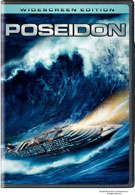Sinking ships and massive waves are nothing new to director Wolfgang Peterson. As the director behind Das Boot and The Perfect Storm, Peterson has definitely been there and done that. Yet it’s that experience that brings a interesting persepective to Poseidon, a new adaptation of the original novel which is separated from being a remake of the 1972 film by its intensity and realism. Imagine what a disaster it would be if a huge wave really overturned an Ocean Liner. Electrical shorts would cause explosions and flash fires. Debris would be found everywhere, as would the corpses of the unfortunate souls who perished in the disaster. Life would not be brightly colored upside-down sets and the occasional hindrance for passengers attempting to journey through the overturned vessel as in the Irwin Allen produced Poseidon Adventure. Instead it would be a difficult path full of grim reminders of what had occurred, if the trip was even possible at all. That’s the movie Peterson has made with this year’s Poseidon.
Gone is the camp and goofiness of the previous version. Peterson works in realities which, albeit is a lot more impressive, adds a bit of morbidity to his version of Poseidon. More bodies lie around than in most horror movies, looking more horrific with wounds from being tossed around like rag dolls and impaled upon steel beams and glass. It’s the type of thing that would give one nightmares if the cameras focused upon it for too long.
Fortunately for the audience, the cameras never really stop to smell the roses. Neither do Peterson’s passengers for that matter. Poseidon is rated PG-13 for “intense prolonged sequences of disaster and peril,” which is a good way to describe the movie as a whole. From the point the ship overturns, at about the fifteen minute mark, the movie is one, long, sustained intense sequence. Characters move from one difficult obstacle to another, with no real relief of pressure. While this is great for an adventure flick, it also causes two downsides. First, there is no time for character development past the first introduction of the characters. Secondly, eventually, the audience tires of the constant intensity. By the time the passengers make it to their final destination and still have issues to contend with, you can’t help but want to say, “enough is enough, give them a break already.”
The constant pressure on the characters (and the audience) is a minor problem. But the lack of character development is an entirely different issue. Because we need to care for these characters and hope they make it through their difficult journey there needs to be some development. Since there’s no rest for the weary between scenes, that development attempts to happen during the intense moments. A daughter reveals to her begrudging father that she’s engaged just as they get ready to leap down a homemade zip line. A stowaway reveals her predicament about a family member as they make their way through a fire filled room. It’s no surprise that, with no time to build the characters, Josh Lucas’s constant smug, charming laugh begins to be annoying as he survives wave after wave (almost literally) of problems. Still, some actors manage to shine even with the little bit of screen time they have to work with. Take Richard Dreyfuss for example, who uses the tiny amount of developmental time to truly shine as a older homosexual man who has just been dumped.
With little time to build characters Poseidon could be a disaster of epic proportions. Instead it captures that disaster on the screen beautifully. The film is breathtaking as one huge visual effect. When the gigantic wave pushes over the ship you believe such a thing could happen. Since there’s no real character development, those effects are responsible for making the audience concerned about the welfare of the characters. That’s where Peterson’s previous experience with both this genre of film and his director of photography excels. While Poseidon may not be very deep, it’s certainly impressive as a popcorn action flick, hitting the audience with waves of suspense visually, if not emotionally. With such a tight turnaround time from screen to DVD, Poseidon could have been given a quick, bare bones release, just trying to recapture some of the losses the studio suffered from its less than impressive theatrical run. Instead this is actually a well done DVD release with the opportunity for more or less bonus material depending upon your personal tastes.
First of all, the transfer of the movie is absolutely gorgeous. I find it very surprising the movie didn’t fare better on the big screen, as this is a movie that definitely takes advantage of a big presentation. If you’re watching this on a thirteen inch television screen you’re going to miss a lot, but the movie will still look beautiful. The colors are rich and vibrant, and the image is incredibly clear – so much so that this movie could be used to argue why we don’t need HD DVD. Standard DVD players with a good connection make this movie look fantastic. Like the visual, the audio is also quite excellent, taking full advantage of surround sound. If you have a nice home theater this movie is almost a must have, just to show off.
The DVD includes the featurette “Poseidon: A Ship on a Soundstage” which is a fairly comprehensive twenty minute making-of short. Although its run time isn’t very long, the mini-documentary covers many aspects of the film, from some of the visual effects to the stuntwork and how much the actors did themselves (a whole lot). It looks at the early stages of the movie as the script was developed to Peterson’s desire to work on the movie sequentially (something that is rarely done in Hollywood) and the added level of detail that was available because of working that way. This is a great short featurette that actually sheds light on the creative process rather than just serving as an extended advertisement like so many other shorts we get on DVDs these days.
Your Daily Blend of Entertainment News
Want to know more? Than the two-disc special edition is probably for you. The single disc edition (which is what we were given to review) makes up the first disc of the two-disc set. We know this because even though it’s the only disc in the case, it is still listed on menus as “Disc 1”. The second disc includes a documentary that follows an intern through the making of the movie and a second documentary about the realities of “Rogue waves.” Although the concept sounds a bit ludicrous as presented in Poseidon, this documentary was created for The History Channel, so is probably a lot more fact based. Since we didn’t have access to this second disc I can’t give you an honest review, but if it’s put together like “A Ship on a Soundstage” it should be entirely worth it.
Poseidon may not challenge its audience with the storyline of survivors making their way through an overturned ship, but as eye-candy it’s a fantastic movie. This DVD release gives the movie a chance at being as good as it can be on home entertainment systems, and while that probably will not live up to the theatrical experience, it’s still worth checking out for a lot of fun.

